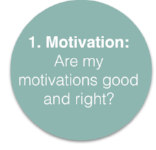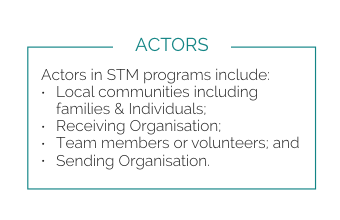As an individual wanting to go on STM trip or a volunteer placement you have a responsibility to do your part to ensure that you are part of ethical trips.
This section of the website will help guide you as you practically outwork the considerations and concepts discussed in the previous ethical framework section, which we suggest you read first before continuing.
The information in this section is designed to be applicable to a range of people wanting to volunteering or serve including individuals wanting to join a team and those wanting to volunteer independently.
This section of the website has been divided into 3 sections (see diagram below). We have aimed to provide practical information, links to resources and sample tools to equip you become an ethical team member or volunteer.
1. Self-Reflection
Before selecting a trip or placement to be part of it is important that you thoroughly consider the following:
- Why do I want to go and serve or volunteer? (Motivations)
- What principles are guiding me as I serve or volunteer? (Guiding Principles)
- What outcomes are you hoping to achieve by going on STM trip or volunteer placement? (Goal)
- What methods and activities do I want to look for in a advertised trip or placement? Which do I know I want to avoid? (Method)
Carefully considering these questions will set a strong foundation to guide you as you make future decisions regarding selecting and being part of a STM/Volunteer program.
Download the below 'Self-Reflection" worksheet to complete as you read the below and reflect on the questions and steps.
Why do I want to go and serve or volunteer?
To Do:
- identify the motivation behind your desire to volunteer. Be honest with yourself. You might have multiple motivations that may include:
- Personal or spiritual growth;
- Experiencing an exiting adventure;
- Wanting to help those in need;
- Be obedient to God's calling;
- Improve future career options;
- etc.
Remember that having intrinsic motivations such as learning, spiritual growth or having a good experience are not wrong but we need to keep them as secondary motivations. The primary driver above all other motivations is putting the best interest of the local communities and families we engage with first. When we don’t we risk unintentionally causing harm to the very people we seek to assist.
- Therefore, consider what could be some potential motivations or desires of other actors involved in your STM program especially local communities, including families and children, you plan to engage with.
It's good to start getting into the habit of imagining the situation from other actors position and asking questions like - 'Would I be happy if someone else did the same thing in my community, school, church etc?', 'What would I feel if someone did the same thing to me?' etc.
What principles are guiding me as I serve or volunteer?
It is important to reflect and determine what principles are guiding you as you embark on joining a STM program or volunteer placement. Clear guiding principles are important to use as a reference and compass to guide your decisions and actions.
For example:
I will seek to uphold throughout our STM program the biblical principles of selflessness, love, justice, equality and wisdom. I will aim to:
- Put the needs of the local communities first over my own desires and motivations (James 1:27)
- Love not only in word but in deed and truth including ensuring I always aim to avoid causing harm (Romans 13:10; 1 John 3;18)
- Uphold the rights of others especially those who are powerless and voiceless based on my belief that all people have equal worth. I will especially commit to safeguarding and upholding the rights of children.
- Act and advocate to call into account systems which perpetuate injustice and poverty (Isaiah 1:17).
- Seek knowledge, learning and understanding. to ensure my actions reflect evidence-based good practice (Proverbs 4:7)
What outcomes are you hoping to achieve by going on an STM trip or volunteer placement?
When it comes to setting ethical goals, getting the right perspective is of key importance.
To Do:
- First find out and consider everyone's goals.
- Evaluate where there could be competing interests or where there is potential for privilege and power to be unintentionally exerted.
- Put the perspective of the local community in the centre and reorient or modify the goals of all other actors to support that goal.
The result should be an ethical end goal that all actors work together in the STM trip to achieve.
With the right goal in mind, you're well positioned to go onto select the right method that will best achieve the ethical goal identified.
What methods and activities do I want to look for in a advertised trip or placement? Which do I know I want to avoid?
It is important to consider which trip is right for you. There are 4 different types of trips, which include:
- Action orientated trips
- Skills based volunteers and exchanges
- Asset Based Community Development Trips
It is vital that you do not choose to go on a trip were you will be undertaking tasks which you don't have appropriate qualifications and experience. Even if you do have the right qualifications it is important that you do not undertIf you are unsure ask yourself 'would this be ok in my own context'?'
- Learning Orientated trip
- Exposure Trips
- Advocacy Trips







